“I thought I had removed the life force completely, but apparently not.”
The vampire rises from his crypt, murder on his mind. Someone has intruded on his private sanctum, and she must be destroyed.
“So you’ve found me out!” he growls. “It will be the last thing you’ll ever do.”
She backs away. They always do — the doomed ones, the prey — scuttling towards the wall, squeaking, searching for the magic words that will make this nightmare stop coming true. And then the interloper says the one improbable thing that could flip the script on the oncoming train wreck.
“No, Barnabas, it’s me!” she chirps. “It’s me, Julia! I’m dressed this way for a reason!”
So this is going to take some explaining. We’re deep in the wilds of Parallel Time, a complex audience-gaslighting scheme in which all of the Dark Shadows characters pretend to be different people with the same names. It’s an extended April Fool’s gag that started on March 30th, and it’s still going strong, all the way out here in late June.
In this concurrent band of time, Julia Hoffman is a violent domestic, a Danvers-style devotee of her high-glam employer, the late Angelique Collins. The she-witch has risen from her grave, and is currently doing business as her own twin sister, endangering all who live on the great estate. Parallel Hoffman is Angelique’s confidante, co-conspirator and personal vampire slayer, and she’s recently learned that Barnabas sleeps in a coffin in the secret room behind the bookcase in the Old House, which is where we currently are.
Hoffman comes to the party with a hammer and stake. She’s sworn to protect her twisted mistress at any cost, even if it means getting fatally clocked on the head with a fire iron by a parallel-universe double who steals her clothes and leaves her lying dead on the bare floor, naked and head-smashed. So guess what happens.
Luckily, Barnabas has been living this kind of life for years now, so he’s used to having people from the past pop up in unexpected forms. He listens to Julia’s tale about the room and the premonition and the stake and the fire iron, and then she points down at the blood-curdled corpse on the linoleum, and everything’s fine.
“You did this for me,” he sighs, and approaches her with a smile. “Thank you, Julia. I’m grateful to you again.” She flutters her eyelashes at him, because murder always brings people together. Then they have a terribly urgent conversation for thirty seconds, standing two and a half inches apart and making unbroken eye contact.
He wants to get her back to her own time, but she brushes the idea aside. “Do you think I would leave? No, you need me here! Angelique thinks that I’m her Hoffman. I can find out all about her plans, before she starts them.”
He tries to talk sense to her, but she’s determined to stay right here in the wrong universe, and assume the identity of her evil twin. This kind of thing is probably happening behind bookcases all the time. You should check yours periodically, just in case.
“Barnabas, I will stay here, I will keep to this plan!” she announces, and then turns away with a childish grin. “Perhaps I like being a spy,” she explains. “I always wanted to be. Who hasn’t?”
And then she gives him a smile that she must have got off Jack Nicholson’s Joker when he wasn’t looking. This is clearly mental illness played as heroics. What is she talking about?
But this is Dark Shadows, red in tooth and claw, and if the mythopoetic trickster figure wants to dress in someone else’s skin and steal fire from the gods, then I guess it’s bad news for Br’er Fox, the Sky Father, Elmer Fudd or Parallel Angelique, as applicable.
So here’s Special Agent Julia Hoffman from the Federal Bureau of Instability, reporting for work at someone else’s job. And luckily, Angelique is off on one of her weird hate jags, where the crazy just tumbles effortlessly out of her mouth.
“I know my murderer, Julia,” she declares. She doesn’t, really. She knows that the doctor found evidence of foul play in the autopsy and assumed the murderer was Quentin, but the doctor, as she also knows, had several screws loose, all in mission-critical places. This might be the only example in supernatural fiction where a murdered spirit returns for vengeance and doesn’t have the faintest idea who their murderer actually was. It’s not a widely-used trope, because it makes everyone look foolish, including the writers and the audience.
Superspy Julia asks what she’s going to do about it, and Angelique indulges in a bit of dramatic clarification. “Everything, dear Julia,” she crows. “Everything.” This is not actually an answer to the question.
“Oh, I have so many plans,” she says, “and each one is better than the last!” I hope she waits long enough for a good one to come along; Angelique’s baseline for quality is not high.
Suddenly, Angelique feels faint and drops to the floor, unconscious. Well, I guess that solves that problem. Julia Hoffman is the most successful spy in the history of espionage.
The witch rallies enough to tell Julia to go find her father, who knows how to keep her life force operational. Of course, Julia doesn’t know what to do — this wasn’t covered in the briefing — so she has a rare moment of doubt.
“Her father,” Julia thinks. “What does she mean? I don’t even know where he lives!” Suddenly, there’s a breakthrough — “The phone book!” — and we’re back on track. You can’t keep Julia baffled for long.
When Julia arrives at Parallel Professor Stokes’ place, she finds the chemistry-wizard jamming fluids into the lady in his back parlor. He immediately launches into a conversation about his crackpot mad science experiment, which luckily happens to be within Julia’s area of expertise. She’s certainly more qualified for this conversation than she is for being a housekeeper. Ask Julia to get a stubborn stain out of the carpet and she’s essentially nowhere, but she’s been plugging dead bodies into electrical sockets for years.
“She did tell you about the body, didn’t she?” asks Stokes.
Julia plays for time. “She was so vague,” she says, “I’m afraid I don’t really understand.”
“Neither do I,” Stokes shrugs. “I must check the body, I was trying to calm it when you interrupted me.”
He heads for the back parlor, and Julia follows, unable to believe her luck. They’re giving people sedatives!
In the back room, they arrange themselves around the body on the slab, and Julia deftly extracts the narrative. Observe the technique.
Stokes: A corpse! That’s what you’d think, wouldn’t you? But we know different. The one thing I overlooked was the strength of the continuing will to survive. Even now, she still struggles to regain her life force. How incredible the human spirit is.
Julia: What do you mean, struggles to get back?
Stokes: She wants to be alive, to walk and talk as we do!
Julia: But you’ve — taken her life force away?
Stokes: Come, Hoffman, don’t pretend to be surprised! Surely Angelique told you that her existence depends on the life force of another!
Julia: I — I didn’t understand.
Stokes: I thought I had removed the life force completely, but apparently not. When she uses her will, poor Angelique becomes as she was when she sent you here.
Julia: But if anything happens to the body…
Stokes: Angelique will die.
You see what I mean? Julia Hoffman has been a secret agent for seven minutes, not counting the station break and a commercial for Salvo Detergent Power Tablets. Look how great she is at this!
All she does is stand there and say “I’m afraid I don’t understand,” and presto, she gets the complete schematic for the Death Star, including the unshielded thermal exhaust ports. Barnabas has been battling Angelique for weeks with no measurable results, and here’s Rogue One, who takes down the Empire with a phone book and a smile.
Tomorrow: Barnabas, Julia and the Lady in the Back Parlor.
Dark Shadows bloopers to watch out for:
Barnabas tells Julia, “No, but it — nothing could be more dangerous for you!”
In act 2, Julia has to run from the Collinwood set to Stokes’ house for the next scene. As Stokes goes to open the door, we can hear her running to the set, and then she cries out, “Ooh!”
When Stokes shows Julia into the parlor, a camera gets into position behind the beaded curtain, and we can see and hear the cameraman moving the beads out of the way.
Angelique says to Julia, “Are you sure… You know my father so well, are you sure he was telling you the truth?”
Julia tells Barnabas that Angelique won’t miss the key she stole: “She has it only in her drawer, and keeps it for emergencies.”
Tomorrow: Barnabas, Julia and the Lady in the Back Parlor.
— Danny Horn

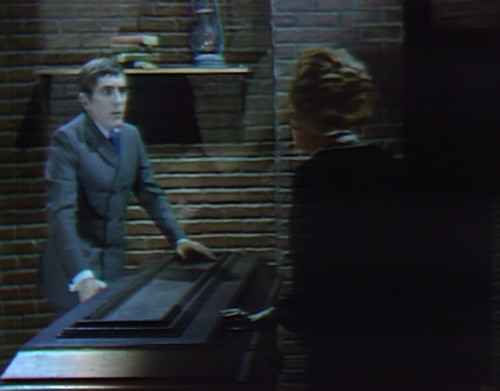
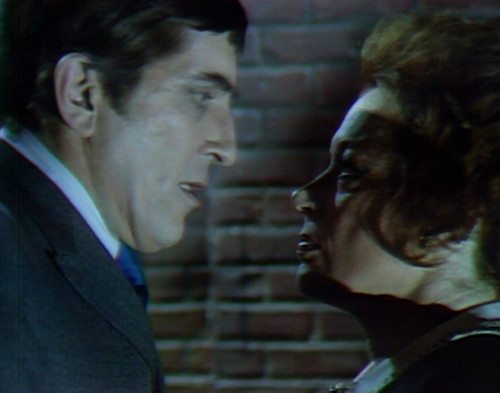
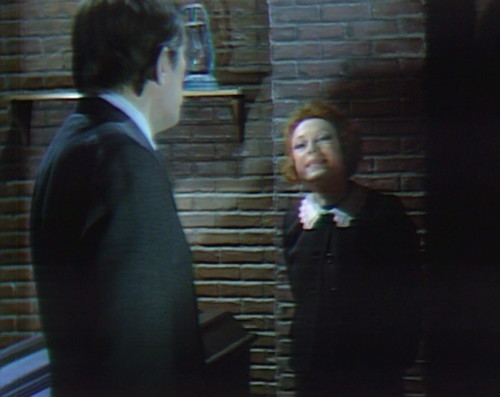
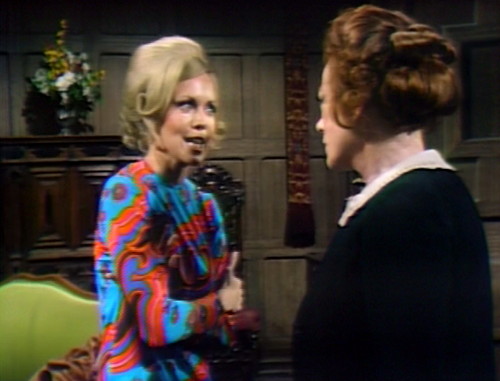
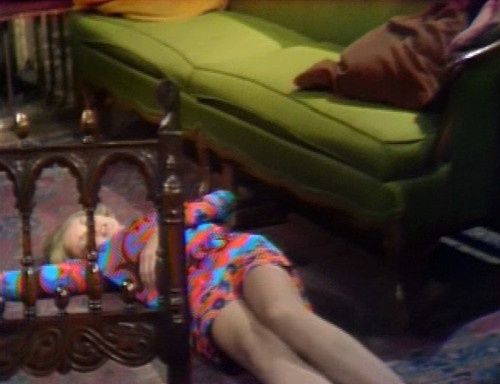
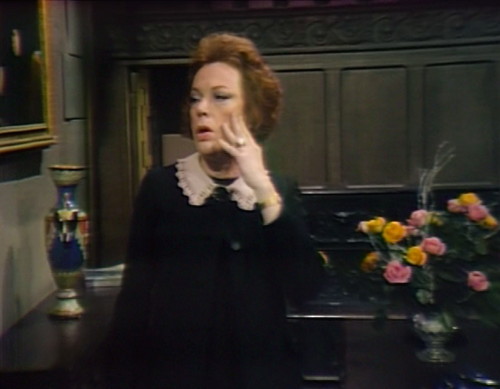
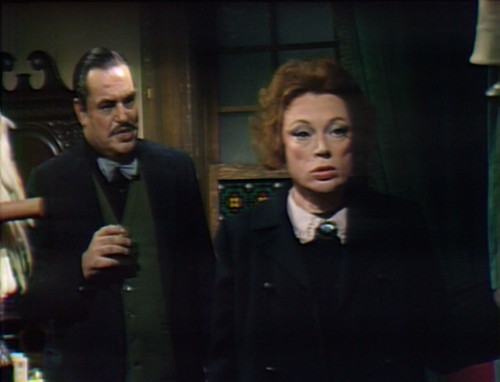
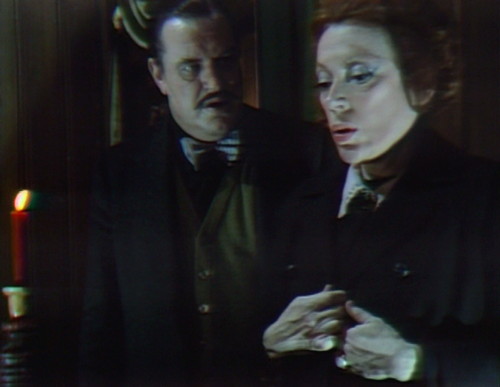
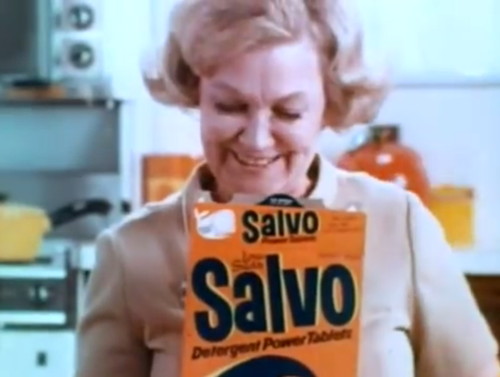
As I re-watched this episode, I became very sad. That Barnabas-Julia eye lock you talk about is a cruel set-up. You can taste Julia’s excitement: He needs me! And then one look at a comatose redhead and Barnabas is gone. The little red haired girl doesn’t even need to open her mouth and it’s all over for poor Julia.
I can’t have been the only one shouting at the screen, “KISS! KISS! Go on…!”
You sure weren’t! Heck, I’ve started yelling that every time they get that close.
These episodes in PT are good examples of how Grayson Hall and Sam Hall worked so well together to support one another as a team of actress wife and writer husband.
Sam saw to it that the writing team gave her character plenty of good material to work with. Which is no doubt what she wanted him to do for her. And she, being an Oscar nominated actress, delivered a very good performance — albeit with some of her characteristically exaggerated facial expressions, which we all find endearing by now.
Now, if only David Selby had been married to … let’s say … writer Violet Welles, for example … then maybe the writing team would have made a point of writing some better material to give Selby instead of allowing his character Quentin to suffer so badly in PT, as the general consensus of Quentin seems to be here on this blog. I could make the same point about many of the other characters in PT who were either poorly developed or not used to best advantage, as the writing generally tended to deteriorate in the final years.
True, Grayson was a very good actress, but the other actors on DS sadly lacked her secret weapon, that is, her writer husband Sam.
The most important thing to remember is that Dan Curtis hired Grayson Hall as Julia Hoffman several months before Sam Hall was a writer for the show — he thought she had an interesting face. The only reason Sam Hall was brought on board was because Malcolm Marmorstein was fired because he decided to take a vacation, thinking he could still write Dark Shadows episodes while living a fantasy writer’s life along the seashore of the West Coast as the rest of the team slaved away in New York.
Toward the end of Dark Shadows it was Sam Hall’s idea to have the Julia Hoffman character killed off, to keep the horror going by having someone else discover the secret of Barnabas, but Dan Curtis wouldn’t go for it.
Julia Hoffman is here in 1970 for the same reason Barnabas is — fan mail. It was Joe Caldwell’s idea in 1967 to have Barnabas upend her in a vat of acid as revenge for the curative experiments going wrong so that he aged — an idea that Dan Curtis followed up on in House of Dark Shadows, where she was strangled instead.
“Toward the end of Dark Shadows it was Sam Hall’s idea to have the Julia Hoffman character killed off, to keep the horror going by having someone else discover the secret of Barnabas, but Dan Curtis wouldn’t go for it.”
Curtis was certainly right about that! I don’t know what Sam Hall was thinking. Grayson made ever episode better.
The Cure Storyline is obviously driving toward Julia’s death — Barnabas threatens her repeatedly and there’s no reason why he shouldn’t kill her other than sentimentality or a desire to continue the experiments. He refuses the latter so Julia becomes basically a liability and the show starts to invent obstacles to to keep her alive (for instance, the notebook, which apparently didn’t even take the basic precautions of simply not naming the Vampire Patient).
Once the series returns from 1795, the only way to justify Julia’s continued existence is if she and Barnabas are not just co-conspirators but actually friends. That also helped make Barnabas a more compelling character.
I like David Selby a lot, but I think he owns some of the problems with Quentin, along with the directors. Even as PTQ was written, there was no need to switch to the Roger Davis School of Acting and get so shouty.
Even the same lines, he could have played it down a little.
I completely agree. Selby had PTQ barking at Maggiealmost as soon as they crossed the Collinwood threshold, way before Angelique started casting any spells.
One of the most appealing things about original recipe Quentin was that no matter how miserable he was making other people or how miserable he was making himself, he always had a sense of humor about it. You can be an absolute badtard as long as you’re a fun absolute bastard. As it stands, it looks like Maggie must have married Quentin for his looks or his money. (And to be fair, he’s got ’em.) That seems natural for the Stokes girls, but it doesn’t really fit with the Maggie they’ve shown us.
50 years of watching soap operas have taught me, you date the cute ones but you marry the rich ones – which makes marrying PTQ a no brainer – despite all the shouting and door slamming.
An even more important cardinal soap opera rule is that when you find out your husband more than likely murdered his first wife, that’s your cue to get that quickie divorce and 7 figure settlement – before he lays you out right next to her!
I mean, I can imagine Maggie having a little girl crush on the handsome Master of Collinwood, but since they all grew up together everybody knew Angelique had set her cap for Quentin, and if they knew what was good for them, to stay out of the way. I’m sure Maggie, up until six months ago, never seriously thought about marrying Quentin any more than she planned on flying over the moon.
The fatal mistake at the heart of this story is not showing one scrap of the Quentin/Maggie whirlwind courtship (and it would have to have been a category 5 tornado, considering the insanely truncated timeline–only six months had passed since Angelique died!) Even a post it note version of their meeting/dating and showing our old, lovable bastard version of Quentin impulsively asking Maggie to marry him after, like, three weeks and her dazzled, infatuated acceptance would go a long way towards us understanding why the hell she’s putting up with him now. If we’d seen who she fell in love with, his utter transformation into Shouty McGrumptster would be more bewildering and less irritating, and we wouldn’t think Maggie such an overforgiving sap.
I said something similar in the comments on an earlier post (after you posted this but I hadn’t seen yours yet, because I’m reading these as I watch the episodes). It’s a huge missed opportunity imo, especially given all the “doubles” and “parallels” in this Parallel Time storyline–Quentin’s transformation from sweet, sensitive, and romantic wooer to taciturn, morose, controlling, and barking and growling husband could have paralleled the Jekyll & Hyde story arc quite well.
Agreed. David S. always had the shouty problem, even as “regular” Quentin; here he just went all in with it.
Thank you for the super-funny recap!
Best line – “Ask Julia to get a stubborn stain out of the carpet and she’s essentially nowhere, but she’s been plugging dead bodies into electrical sockets for years.”
Yeah – I always felt sorry for Julia Hoffman, even as a kid watching for the first time. She got a raw deal caring for Barnabas, who didn’t give her the time of day romantically. On the other hand it was kind of dysfunctional of Julia not to just wash her hands and go back to Boston or NYC or wherever she was from.
It’s called codependence! There’s a program for that!
Wouldn’t that be something to insert therapy into DS? 🙂
I remember in one of Frid’s talk-show appearances during the run of DS, he describes Julia as “the vampire’s analyst.”
This wasn’t the first time that Barnabas and Julia had become amateur sleuths but it seemed like from here on they were now a team. Not really Sherlock and Watson but equals. I often felt that post-1971 they might have continued their partnership as a Kolchak: Night Stalker type private detectives. I think Dan Curtis was going for something like this in the 1969 Dead Of Night pilot..not the ’77 anthology. Of course Grayson Hall and Jonathan Frid would had been up for it and we know Frid had grown weary of DS. The show had pretty much used up the monsters, ghosts and others skeletons in the Collins family closet and exhausted the time travel possibilities (except the 1920s). So taking the Barnabas & Julia characters “on the road” while keeping viewers caught up on the Collinses back home was a possibility.
I really like that idea, Tony. While they’re on the road, we could cut back and forth with their supernatural stories and more soap-type stories at Collinwood. There were good stories in 1897 that didn’t have heavy supernatural influences.
I wonder how much they influenced Moulder and Scully — I’ve read that X Files was influenced directly by another Dan Curtis project you mention, Kolchak: The Night Stalker.
I’m watching an episode of The Night Stalker right now, where one of Kolchak’s colleagues is wearing a shawl made out of the Collinsport Afghan to the office Christmas party.
Oh! I saw your comment, so I put the DVD on for that episode, “The Werewolf”. Set aboard the Queen Mary, though when they show the ship at sea it’s the S.S. France. But, yeah, dear old Emily wearing that colorful covering at the INS Christmas party — it almost does look like one of the Collinsport afghans, doesn’t it? But it’s just a bit to bright around the edges and so forth, and not quite the same. But, who knows — in a parallel time of 1974…
There’s a blooper in that episode. At the end Kolchak talks into his recorder about the four passengers who were attacked — those would be the four at the swimming pool. Besides the woman who was thrown overboard early on, there’s also the man that Kolchak discovers toward the end as he’s going out with the gun with silver bullets, the man just inside his cabin with the gold chain around his neck, who was apparently the character played by Dick Gautier — that would make five!
I was eight in 1974 when Kolchak: The Night Stalker debuted, and that’s one of my favorite all time TV shows — I was always there in front of the TV for that, every Friday at 8 p.m. Even after Dark Shadows, the work done by Dan Curtis has been a big part of my life.
Hey, you’re right! I never noticed that discrepancy in the casualty list.
After reading about Kolchak for years, I first saw it on Netflix and watched both movies and the series over and over. Most, if not all, episodes are on YouTube now, but Me-TV also shows it on Sunday nights at 10:00, and it’s a nice way to wrap up the weekend.
No “amateur sleuths” here…the correct term is “junior detectives.” LMAO! If you didn’t catch that sweet Dannyism in earlier blogs, you’re missing out.
I looked behind the bookcase. The Mountie doll’s hat was back there!
Danny,
Nobody does it better,
Though sometimes I wish someone could.
Nobody does it quite the way you do,
Why’d you have to be so good?
Starting in 1962 with the release of the first Bond film “Dr. No” there was an explosion of glamorized spy films, TV shows and books that lasted for quite some time so everyone may actually have wanted to be a spy then.
And Grayson Hall had a guest role in an episode of “The Man From U.N.C.L.E ” where she played a spy – albeit she was working for the bad guys!
IMDB says she was also in a “Girl From UNCLE” episode though I don’t know who she played. I would want to be a spy, too, if I got to hang out with Robert Vaughn and David McCallum in 1967!
She plays the assistant of a mad scientist in the employ of the bad guys. So being Eric Lange’s assistant was almost type-casting!
It is only at this point when Julia’s unrequited love for Barnabas, so important in DS fandom, starts to be played out obviously. This is what I believe Grayson Hall was referring to once when she said she started conveying the unrequited love angle through a glance or an inflection, even when it wasn’t specific in the lines she was saying. The only earlier time it’s obvious is the jealousy Julia shows over Vicki in 1967 and the line about maybe someone (herself) submitting to Barnabas willingly. Between that moment and now, however, there’s no hint of Julia’s feelings. In a few weeks, at the end of PT, right begire 1995, we will get the poignant moment between J and B, where Barnabas basically tells her it’s never gonna happen. After that, we go back to no reference at all. For something so much a part of the DS myth, it’s surprising how infrequently Julia’s unrequited love for Barnabas is actually depicted on screen.
It might have been interesting for DS writers to be more intentional with the original curse laid on Barnabas that anyone he loves will die.
Actually, it’s those who love HIM that will die, so, watch it, Julia.
As we discussed on the blog during 1795, it’s possible that Angelique — who cast the curse — doesn’t fully understand non-selfish, non-romantic love. Granted, that mostly explained the survival of Joshua and Ben, who both cared for Barnabas. And Sara and Naomi’s love was “non-romantic,” as well.
So, yes, Julia should be a dead woman. In fairness, she looked on that path when Barnabas was a vampire in 1967 and she was arguably in love with him. He was cured for the bulk of ’68 and she wasn’t around him for long during 1897 (and she almost died a few times there).
I think if you are immortal, everyone who loves you will die. Your curse is to outlive those you love and who love you. Either that or Julia survives because she’s the one who broke the curse by creating Adam. Maybe the Leviathan counts as a different curse? The truth is that Julia is essential so she has to survive.
That’s a really good point–it could be that Angelique meant just that, that the curse she put on Barnabas would ensure he outlived all of his loved ones. Then when he tried to make Josette as he was so that they could spend eternity together, Angelique was forced to intervene in order to prevent that from happening. But there was at least one time, maybe more, when Barnabas seems to have taken “everyone who loves you will die” part literally.
How did our Julia know PT Angelique’s last name?
We can assume Will told her.
I think it is hilarious when Julia smiles as Barnabas starts to open his coffin.
That is her friend.
Definitely a moment of intentional humor.
“…and then she points down at the blood-curdled corpse on the linoleum, and everything’s fine.” It’s clear from the scene that the body of Hoffman is no longer there. Julia does pick up the hammer and stake to show Barnabas, but she doesn’t point to a body on the floor.
i feel like we’ve been going at breakneck speed; it’s been fun getting to the resolution of some stories while others open. Many of the recent episodes were real cliff hangers, making for great binge watching
I too am waiting to hear who stuck the hatpin in the back of Angelique’s neck. I know it doesn’t seem plausible, but they made a point of showing Hoffman handing the voodoo pin to Angelique not long ago when she was using the clay doll against Quentin. Hoffman said something to the effect of “Were you looking for this?” Just sayin’…
This post not only has a great title “The Spy Who Loved Me” and as usual, an excellent subject/body: Julia as the trickster and the various elements of her relationship with Barnabas; “sad”, “childish grin” and “unbroken eye contact”. I think yesterday it was pointed out she “fluttered her eyelashes” and smiled lovingly when closing his coffin, as if saying “goodnight, you’re safe now”
But the closing paragraph of today’s piece is just classic, with that awesome Star Wars reference:
“All she does is stand there and say “I’m afraid I don’t understand,” and presto, she gets the complete schematic for the Death Star, including the unshielded thermal exhaust ports. Barnabas has been battling Angelique for weeks with no measurable results, and here’s Rogue One, who takes down the Empire with a phone book and a smile”
“This kind of thing is probably happening behind bookcases all the time. You should check yours periodically, just in case.”
This made me spit out my drink.
Incidentally, Rogue One happens to have been the last movie I saw in a theater before the pandemic (I know it came out well before the pandemic but I stopped going to movie theaters regularly years ago).